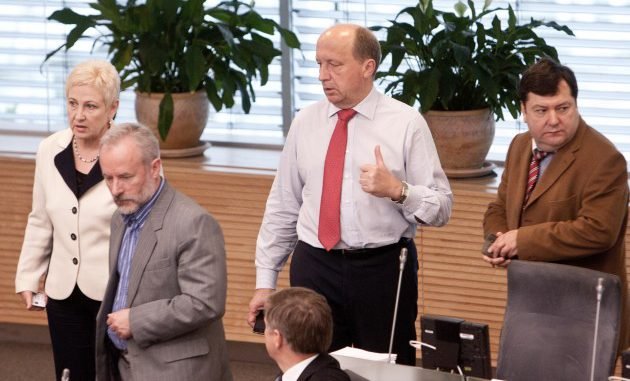
Algis Krupavičius, professor at Vytautas Magnus University in Kaunas, says that the Russian threat, while a legitimate concern, might sometimes be over-used by politicians.
“Primarily, the card will be used to mobilize centre-right voters, mostly those of the [conservative] Homeland Union – Lithuanian Christian Democrats. President Dalia Grybauskaitė, the party’s key ally, is also readily playing the card in her public statements,” Krupavičius tells LRT.
How effective the strategy will be will largely depend on developments in the European Union, in Russia itself and, to some extent, in Ukraine. “If there are more signs that Western countries, primarily in the EU, are engaging with Russia more actively, that relations are returning to normal, this card will be more difficult to use. But if the current status quo persist, or the situation becomes even more tense, the card will be more effective and centre-right parties can expect mobilize more voters with it,” he says.
Mažvydas Jastramskis of Vilnius University is more reserved. He believes that unless there are dramatic developments on ground in Ukraine, security threats are unlikely to be the crucial factor in most voters’ choice at October’s polls.
“There are many parties in Lithuania. It makes sense for some parties to have their specific issues to engage voters. Therefore the liberals and the conservatives could talk about it [security threat] during their campaigns, but this will hardly help them win many new voters. It is more likely that the rhetoric will be intended for their traditional electorates,” Jastramskis tells LRT.
A survey, conducted by Spinter Tyrimai in December 2014, showed that over half of Lithuanians (54.5%) were convinced at the time that their country’s independence was in real danger. Some said the threat was recent, while others believed that the problem had always been at Lithuania’s doorstep.
It was the height of the Ukraine crisis triggered by Russia’s aggression. Ignas Zokas, the director of Spinter Tyrimai, says that moods have abated since then.
“Look at the general context. At the time, the media ran a lot of stories [about Russia’s aggression and security issues] and the situation was much more tense. Everyone was on the edge. Now people are more relaxed. It is evidenced by domestic consumption, too, people are buying things. This means that they are more confident about the future,” Zokas says.
He adds that the parties will respond to topical issues in shaping their platforms. These will begin to emerge in spring.

Be the first to comment